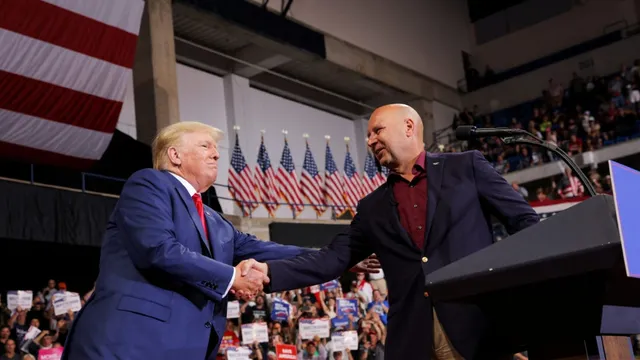News Desk, Kolkata : In the heart of North Carolina’s 10th district, a trio of Republican primary candidates—Diana Jimison, Charles Eller, and Brooke McGowan—have ignited a fervent discussion by boldly questioning the legitimacy of the 2020 election. Their narrative extends far beyond mere skepticism, delving into a realm of proposed governance reforms aimed at fortifying election integrity and enhancing accountability.
As the political landscape continues to evolve, these candidates are not merely echoing the sentiments of a faction; they are spearheading a movement. Their call for scrutiny and reform has captured the attention of voters who crave transparency and reassurance in the democratic process.
The trio’s skepticism about the 2020 election is not an isolated sentiment, resonating with a segment of the population that feels disenfranchised or distrustful of the electoral system. Jimison, Eller, and McGowan have artfully transformed this sentiment into a platform, offering a vision for a more accountable and secure democratic process.
The candidates are not content with merely casting doubt; they are proactive in their pursuit of change. Central to their platform are governance reforms designed to reshape the political landscape. Among these proposals are term limits, a concept that has gained traction in recent years as a means to prevent entrenched political power and foster fresh perspectives within government.
Jimison, Eller, and McGowan are not stopping there. Their platform also advocates for a reduction in foreign aid, citing a need to prioritize domestic concerns and redirect resources towards issues that directly impact their constituents. This bold stance resonates with voters who believe that a recalibration of priorities is necessary to address the pressing challenges facing the nation.
The candidates’ narrative is striking a chord with a diverse array of voters, transcending traditional party lines. Their emphasis on governance reforms reflects an understanding of the public’s desire for change and accountability. As the 10th district becomes a focal point for this grassroots movement, the trio is gaining momentum and reshaping the discourse around election legitimacy.
While some critics dismiss their claims as unfounded, the candidates have embarked on a mission to bridge the gap between elected officials and their constituents. Their commitment to transparency is not just lip service; it is a call to action that challenges the status quo and demands a reevaluation of the democratic process.
As the candidates gain traction, their narrative has transcended local politics, resonating on a national level. The debate over election legitimacy and governance reforms is not confined to North Carolina but has become a focal point in discussions about the future of American democracy. The trio’s bold proposals are forcing both parties to confront the need for systemic change.
In the face of this momentum, traditional political figures are taking notice. The 10th district’s Republican primary is evolving into a microcosm of the larger national conversation surrounding election integrity. The trio’s calls for reform are prompting a reassessment of priorities, sparking conversations that extend far beyond the confines of the district itself.
Jimison, Eller, and McGowan’s narrative is not without its challenges. Critics argue that their skepticism about the 2020 election is unfounded and potentially damaging to the democratic process. However, the candidates remain undeterred, emphasizing that their goal is not to undermine confidence in the system but rather to strengthen it through meaningful reforms.
As the candidates continue to amplify their message, the electorate is faced with a choice – to embrace the status quo or to champion a new vision for governance. The 10th district’s Republican primary has become a battleground for these competing narratives, with implications that extend far beyond the borders of North Carolina.
In the coming months, the nation will watch as Jimison, Eller, and McGowan navigate the political landscape, challenging established norms and advocating for a reimagined democracy. Whether their proposals gain widespread support or encounter resistance, the trio has undeniably sparked a conversation that will reverberate through the corridors of power, forcing a reevaluation of the very foundations of American democracy.
DISCLAIMER
Our news media denounces any form of bias and disapproves of sensationalism. The disseminated news is entirely educational and aimed at social awareness. Our media maintains absolute impartiality, adhering solely to the purpose of education and social consciousness.


